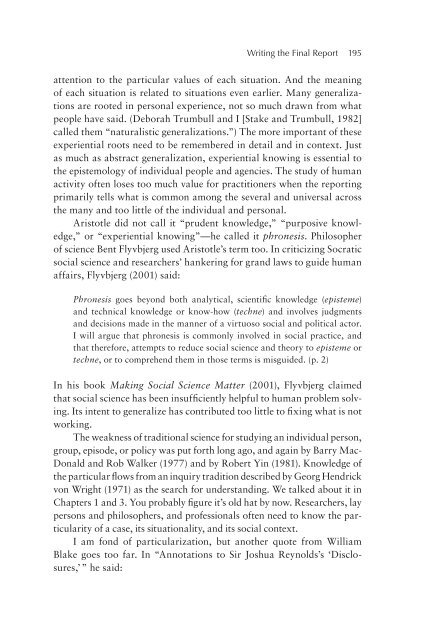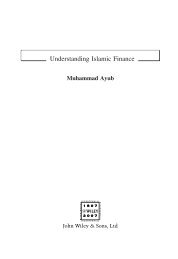How Things Work - Doha Academy of Tertiary Studies
How Things Work - Doha Academy of Tertiary Studies
How Things Work - Doha Academy of Tertiary Studies
Create successful ePaper yourself
Turn your PDF publications into a flip-book with our unique Google optimized e-Paper software.
Writing the Final Report 195<br />
attention to the particular values <strong>of</strong> each situation. And the meaning<br />
<strong>of</strong> each situation is related to situations even earlier. Many generalizations<br />
are rooted in personal experience, not so much drawn from what<br />
people have said. (Deborah Trumbull and I [Stake and Trumbull, 1982]<br />
called them “naturalistic generalizations.”) The more important <strong>of</strong> these<br />
experiential roots need to be remembered in detail and in context. Just<br />
as much as abstract generalization, experiential knowing is essential to<br />
the epistemology <strong>of</strong> individual people and agencies. The study <strong>of</strong> human<br />
activity <strong>of</strong>ten loses too much value for practitioners when the reporting<br />
primarily tells what is common among the several and universal across<br />
the many and too little <strong>of</strong> the individual and personal.<br />
Aristotle did not call it “prudent knowledge,” “purposive knowledge,”<br />
or “experiential knowing”—he called it phronesis. Philosopher<br />
<strong>of</strong> science Bent Flyvbjerg used Aristotle’s term too. In criticizing Socratic<br />
social science and researchers’ hankering for grand laws to guide human<br />
affairs, Flyvbjerg (2001) said:<br />
Phronesis goes beyond both analytical, scientific knowledge (episteme)<br />
and technical knowledge or know-how (techne) and involves judgments<br />
and decisions made in the manner <strong>of</strong> a virtuoso social and political actor.<br />
I will argue that phronesis is commonly involved in social practice, and<br />
that therefore, attempts to reduce social science and theory to episteme or<br />
techne, or to comprehend them in those terms is misguided. (p. 2)<br />
In his book Making Social Science Matter (2001), Flyvbjerg claimed<br />
that social science has been insufficiently helpful to human problem solving.<br />
Its intent to generalize has contributed too little to fixing what is not<br />
working.<br />
The weakness <strong>of</strong> traditional science for studying an individual person,<br />
group, episode, or policy was put forth long ago, and again by Barry Mac-<br />
Donald and Rob Walker (1977) and by Robert Yin (1981). Knowledge <strong>of</strong><br />
the particular flows from an inquiry tradition described by Georg Hendrick<br />
von Wright (1971) as the search for understanding. We talked about it in<br />
Chapters 1 and 3. You probably figure it’s old hat by now. Researchers, lay<br />
persons and philosophers, and pr<strong>of</strong>essionals <strong>of</strong>ten need to know the particularity<br />
<strong>of</strong> a case, its situationality, and its social context.<br />
I am fond <strong>of</strong> particularization, but another quote from William<br />
Blake goes too far. In “Annotations to Sir Joshua Reynolds’s ‘Disclosures,’<br />
” he said:

















